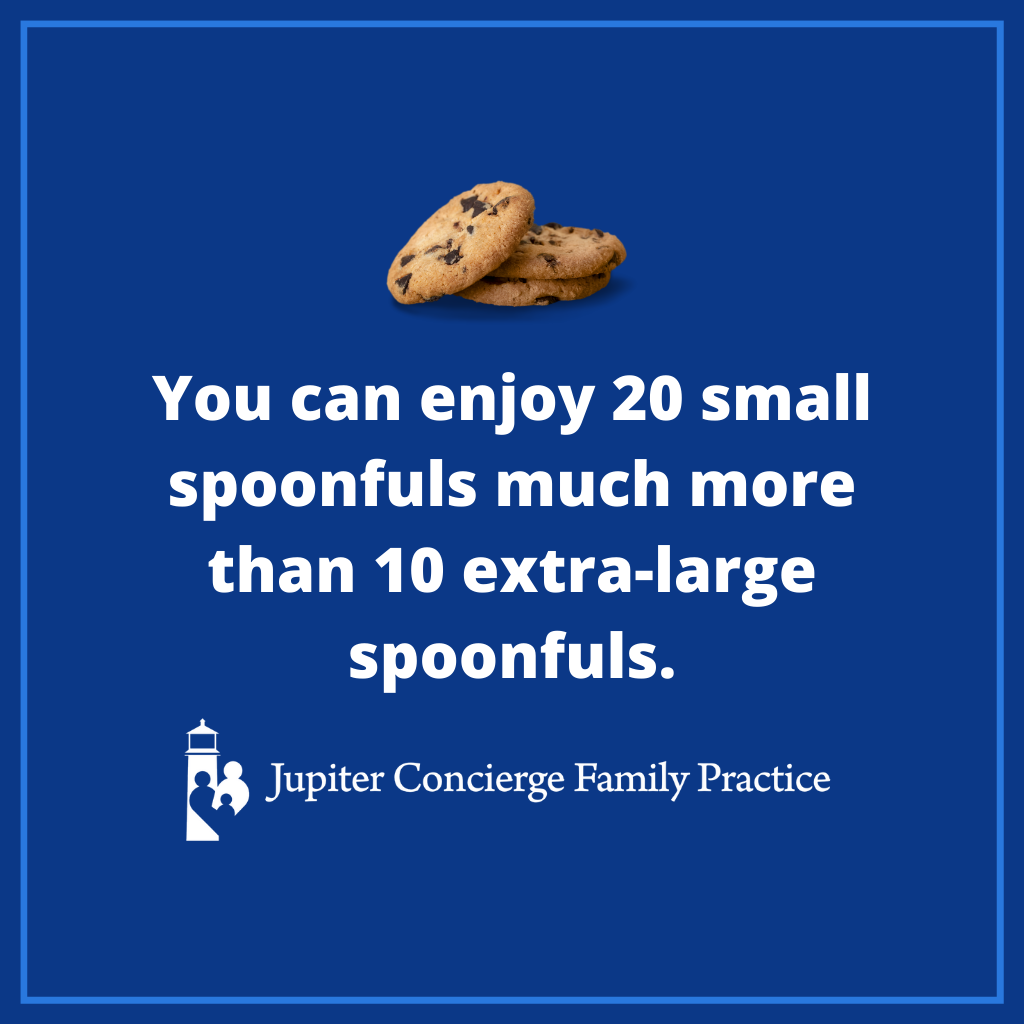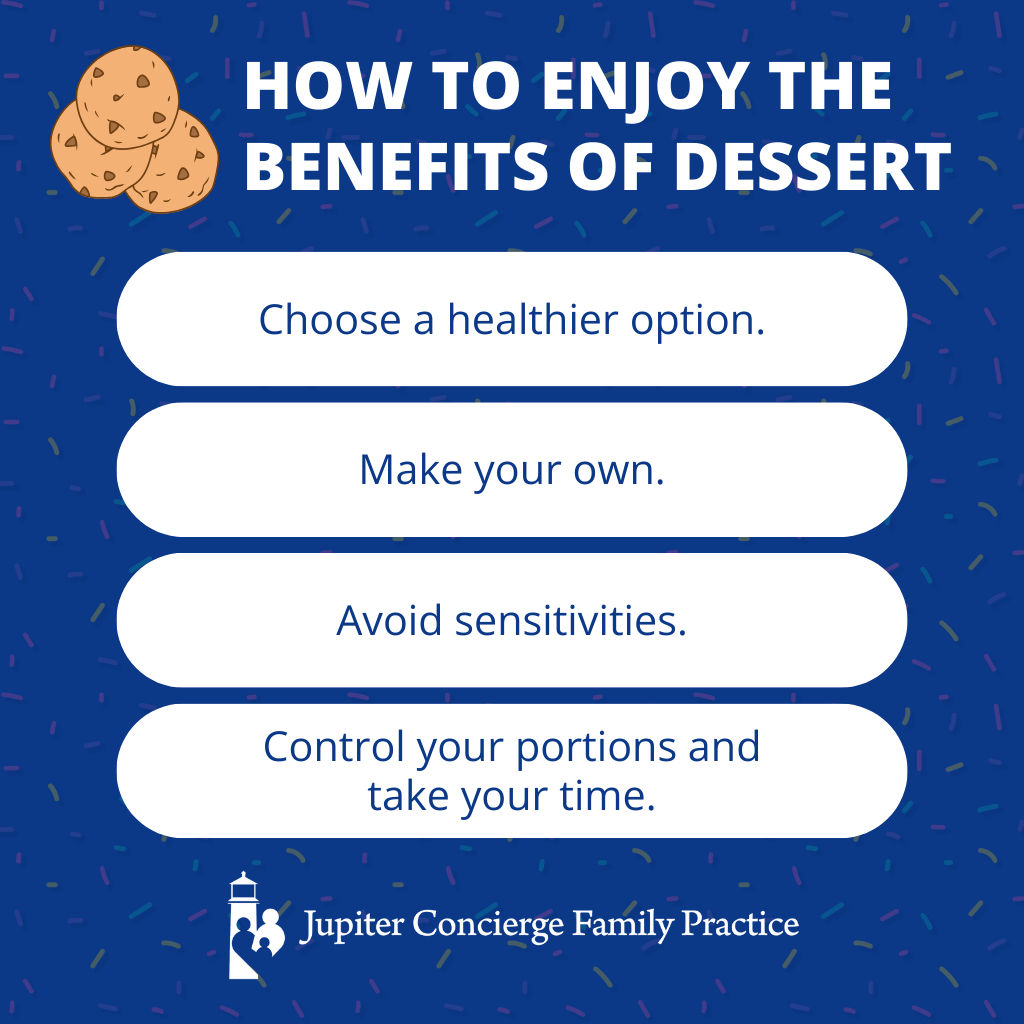
In medicine, some topics are harder to write about than others. But today’s, I hope, will bring us all a little bit of joy — because the news is good!
We’re trained to think of desserts as something to avoid. They’re a “guilty pleasure,” an indulgence. Popular diets tend to focus on removing desserts and sweets, which can contribute to a sort of collective guilt around having and enjoying dessert.
That good news I referenced above is twofold: not only does having dessert not have to be a guilt-laden experience, but dessert also isn’t necessarily bad for you. Let’s look at dessert from a different viewpoint and explore the potential benefits of dessert.
Just Desserts: Benefits for Your Body & Mind
While I’m about to share some very real benefits of dessert with you, we must still keep in mind that old adage all things in moderation. Overindulgence in almost any nutrient can cause harm, and this is especially true for sweets.
With that in mind, let’s get to the good stuff: the benefits of a moderate helping of dessert.
Physiological Benefits of Dessert
There’s generally no medical reason to cut desserts entirely out of our lives. In fact, desserts can confer several oft-overlooked benefits to our bodies.
Small amounts of sweets help stimulate digestion, giving us a sense of enjoyment and relaxation. For the parasympathetic nervous system to be able to do its job of digesting our food, we need to be in a non-rushed, relaxed state. What better way to do that after a meal than having a cup of coffee or tea and a small dessert to share with someone?
In particular, the physiologic benefits of dessert center around dark chocolate. Many studies show benefits of eating dark chocolate, from boosting our serotonin levels to reducing inflammation.
Granted, of course, this is all in moderation.

Psychological Benefits of Dessert
There are several ways to look at the psychological benefits of dessert. Desserts, as you may have noticed, spelled backwards is “stressed.” We often think of desserts as the antidote to stress, and while it’s important not to go to extremes, there’s some truth in that.
We can use desserts as rewards, and we can be smart about it — even when eating out. It’s been shown that if you choose your dessert at the outset of the meal, you enjoy the meal more. And knowing that you get to have dessert means you feel like you need the dessert less. (What can I say? We’re funny creatures.)
Deciding in advance — and planning to split your dessert with a friend or take half of it home — also saves you from attempting a rushed conversation under pressure as the waiter stands over your party. By planning ahead, you avoid impulsive, stuff-yourself-full decisions.
Another psychological benefit is the enjoyment of dessert. Particularly restrictive diets in which dessert is forbidden can cause stress and feelings of deprivation during a meal. Sensibly indulging in dessert — without guilt — can reduce that type of stress, boost hormones of happiness, and facilitate improved digestion.
Finally, dessert can be a social, relaxing, enjoyable aspect of life. So, if you completely deprive yourself of dessert, you may miss out on more than just a sweet treat. That said, you do need to be smart about it. Here are some tricks to help you do dessert responsibly.

How to Dessert
By employing a few simple tricks in your approach to dessert, you can increase the benefits you experience.
- Choose a healthier option. Frozen yogurt (versus ice cream) and berries with a dollop of cream are two examples of lighter, but enjoyable, desserts. Also consider where you are. If you’re eating at a restaurant that makes their own desserts, your options will likely have far fewer preservatives than desserts that come ready-made off a truck.
- Make your own. The best way to ensure your dessert isn’t full of unnecessary nonsense is to make your own at home. For example, you might make frozen fruit pops at home to avoid mysterious ingredients and control processed sugar. If you want something a little richer, consider giving away half of whatever you make to your neighbors. If they aren’t your friends yet, they will be.
- Avoid sensitivities. Keep your food sensitivities in mind when you’re ordering or making dessert. If you’re lactose intolerant, for example, try sorbets or ice creams made with nut, oat, soy, or coconut milk. They may not all be home runs, but many milk-alternative offerings now taste almost indistinguishable from dairy. Find a few go-to options you love.
- Control your portions and take your time. This is one of the most important dessert moves you can make. Remember that the amount you put on your fork is what matters, not what’s on the plate. You can make this into a game you play with yourself, if you like. Take a sliver of cake, a small spoonful of ice cream, and endeavor to actually taste every part of it. Not only will you enjoy what you eat more, you’ll likely eat less of it. You can enjoy 20 small spoonfuls much more than 10 extra-large spoonfuls.
Conclusion: Eat Dessert (Carefully)
The benefits of eating dessert are ours to enjoy, as long as we’re deliberate and smart about it. Remembering your body’s sensitivities and needs, making dessert a social affair, and allowing yourself some enjoyment all add up to a guilt-free, simple pleasure that benefits the body and mind.

Dr. David Rosenberg
Dr. Rosenberg is a board-certified Family Physician who obtained a BS in Chemistry at Georgia's Mercer University in 1983 and a medical degree from the University of Miami in 1988. He completed his residency in Family Medicine at The Washington Hospital in Washington, Pennsylvania, in 1991 and then practiced Emergency Medicine at Palm Beach Gardens Medical Center for two years. In 1993 he started private practice in Jupiter.
Dr. Rosenberg has been married to his wife Mary for 38 years and they have three grown children together. Some of his interests include being a huge baseball fan, sailing, snow skiing, self-development, and learning to play piano.
